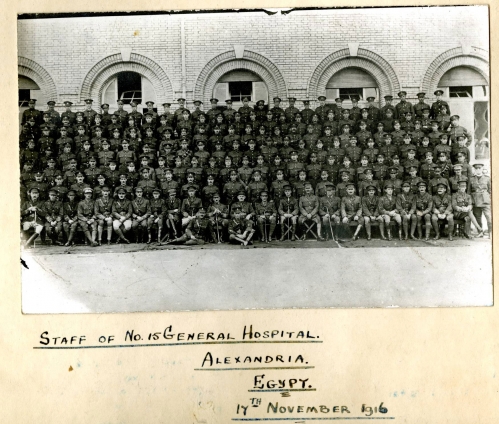The Diary of the Gunning Brothers of Company "D"
Published on 29th October 2015
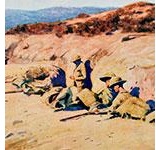 Frank Douglas and George Cecil Gunning were just two of the thousands of Irish soldiers who fought in the British Army during World War 1. The full horror of what they experienced and witnessed is captured in their diary, which is held in the Royal Dublin Fusiliers Association Archive at Dublin City Library and Archive. The article below by Phoebe Sherman reflects on the importance and impact of such eye-witness accounts:
Frank Douglas and George Cecil Gunning were just two of the thousands of Irish soldiers who fought in the British Army during World War 1. The full horror of what they experienced and witnessed is captured in their diary, which is held in the Royal Dublin Fusiliers Association Archive at Dublin City Library and Archive. The article below by Phoebe Sherman reflects on the importance and impact of such eye-witness accounts:
Historical archives such as their diary tell and remember history in a different way than books and secondary texts do. These tell stories, and emotions. These turn the often repeated facts of textbooks into the stories that our own family members might have lived and died.:
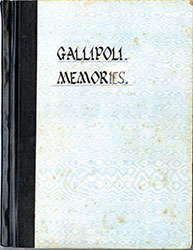 The Diary of the Gunning Brothers of Company “D”
The Diary of the Gunning Brothers of Company “D”
Known as Frank and Cecil, Frank Douglas Gunning and George Cecil Gunning came from a family of five children. The Gunning family hailed from Enniskillen and both Frank and Cecil attended the Portora Royal School nearby.
After graduating school, both boys went to work as bankers. Frank began to work for the Bank of Ireland in Sligo and Cecil was employed by the Belfast Savings Bank in Pettigoe, Co. Donegal. At the outbreak of World War I, thousands of young men across Ireland enlisted, and Cecil and Frank were no exception.
With the permission of the bank to take leave of his job enlist Cecil went to Dublin to offer his services. Frank had also applied to the bank where he worked for permission to enlist but his application was refused. Not willing to be left behind, or risking the possibility to be put in a different company than his brother, Frank left anyway. As Cecil recorded in their diary:
He [Douglas] took the law into his own hands and walked out of the Bank. He cycled from Sligo to Enniskillen and caught the train to Dublin. Needless to say the Bank people were very annoyed.1
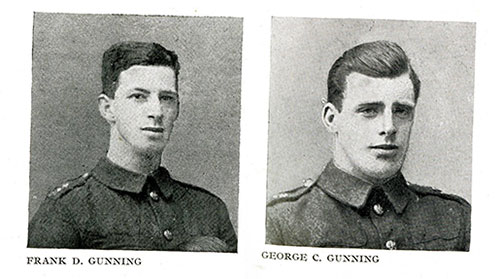
Above: Frank Douglas and George Cecil Gunning
The brothers enlisted into ‘D’ Company, 7th Battalion of the Royal Dublin Fusiliers in September 1914. Their diary begins on 10 July, 1915, when they set sail for the Dardanelles. This first part of their diary is tinged with excitement and colourful details of all the places they stopped along the way to Gallipoli. On the 26 July, 1915 Cecil wrote:
A terrible mania for stealing clothing and towels especially has developed on the boat. Several times we have had stuff stolen and in two cases it was towels, so to-day Douglas got another towel bagged on him so he bagged another one to make up for it, and when I was bathing I hid my towel under a stairway for safety, and I was fairly raging when I came out and found it gone. When I had cooled down I reported the matter [ ] Douglas, but sympathising with me he went into fits of laughter. The reason was this. The towel that he took so much trouble to bag was the one I had taken so much trouble to hide.2
Stories like these are wonderful because they not only give an insight to the life aboard a Military transport ship that tell more than the everyday duties and parades, but also show a very human and very real side to these young soldiers.
Frank describes in great detail, the experience of landing at Suvla Bay. He writes about how immediate the violence was, and about seeing the deck stained with red. Frank and Cecil tried to stick together as long as they could but eventually chose to separate;
Suddenly, without any warning, a firing shell came down with an awful thud not five yards in front. The three of us were covered with clay and sand but not a [ ] bullet got any of us. Cecil leaned over and shouted “you hit, Frank?”, and I said “No, are you?”, as I brushed the sand out of my eyes and clothes …“Well,” says Cecil to me “There’s no use us being hit together, so we’ll separate and you go to the right and I’ll go to the left.”3
Days later, upon advancing on the beach, the brothers were able to find each other again. Frank and Cecil made sure to check on each other in the trenches as much as they could4. At this point, any romantic notions of war had long worn off. About a horrific day in August, when “D” Company suffered extreme losses, Frank wrote:
That evening Cecil and I were sharing the same dugout, and we sat there looking at the sun sinking in the west, and thinking of Home, sweet, home. We did feel miserable thinking of the heavy losses and our pals, who were missing,”5
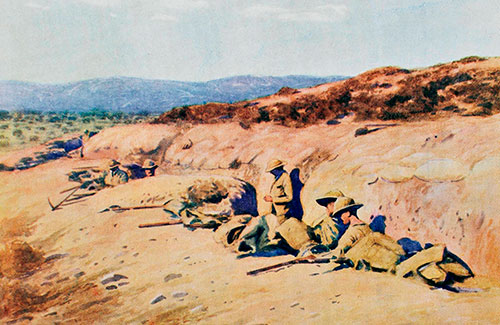
Above: D Company, 7th RDF, in trenches at Chocolate Hill in Henry Hanna, The Pals at Suvla Bay (Dublin 1916)
Frank contracted dysentery in Gallipoli and in August, 1915, it had gotten so bad that Cecil encouraged him to see a doctor6. Frank was sent to a hospital in Lemnos with the expectation that he would be able to rejoin his company soon.
After the battle of the ridge, an officer came to “D” Company and had everyone all stand in an inspection-like fashion. Cecil wrote that a staff officer said that any man who wished a commission should step forward. He goes on to say:
I was very sorely tempted to step forward also because I was heartily sick of roughing it in the ranks— carrying on with a little bit of comfort as an officer would be very welcome. Then I remembered Frank. I thought he was still in a Field Hospital on the peninsula and if when he got better and returned to the company it would be a terrible let down for him to find that I had left him after all our adventures together back at home and abroad.
Frank however never rejoined the 7th Battalion RDF. When he recovered from dysentery, he was transferred into the 6th Royal Inniskilling Fusiliers and the Western Front.
By the end of October 1915, Cecil also came down with a serious bout of dysentery. The first medical officer he saw gave Cecil the treatment of ‘M and D’; i.e. medicine and duty. This officer had a reputation of being hard on the men. When his dysentery only worsened, a kinder medical officer realized how sick Cecil was and gave the orders for him to get help at a hospital.
After a near-death trip on the back of a wagon, he was brought by an ambulance to Salonika and officially diagnosed with severe cases of jaundice and dysentery. He was boarded on the hospital ship The Grantully Castle which set sail for Alexandria, Egypt. He never saw “D” Company of the 7th Battalion RDF again.
Above: Alexandria Hospital Staff, November 1916 (click to view larger image)
The hospital in Alexandria was set up in what had been a Convent. In early 1916 he was deemed well enough to be sent to Alexandria to work in a Details Camp but soon the dysentery returned and he was sent back to the hospital, where he stayed as a working patient7. Cecil continued to work in the hospital for the next year.
In May, Cecil received the heartbreaking news that his father had died. Only a few months later, Cecil’s sorrow worsened. Frank was killed on the 1st of July at the Battle of the Somme.
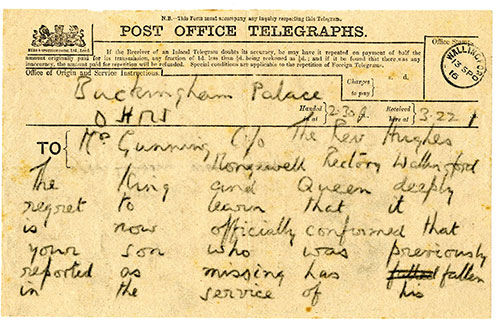
Above: Telegraph confirming the Gunning family of death of Frank at Battle of the Somme
Frank’s death devastated Cecil. After all, they had been together since boyhood, playing together, enlisting together, almost dying together, and Cecil had even given up a commission so that he could stay close to Frank. Cecil was refused compassionate leave.
By 1917, Cecil’s health was doing much better. Though still in the hospital, he was well enough to take a sightseeing trip around Egypt, and had moved on to solid food.
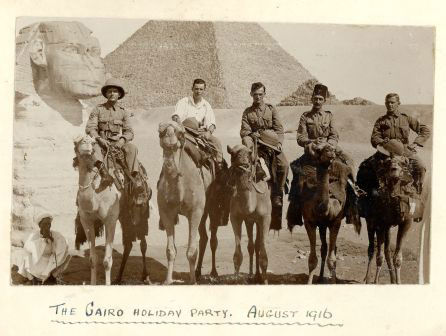
Above: Cecil at Cario, August 1916
Cecile applied and was accepted into the Royal Flying Corps at Cairo in January 19188. Before he had completed his training, the Armistice had been signed and war finally over. Cecil described the scene in Cairo:
“We made straight for the town to see the rejoicing. The city was packed with civilians and troops of all nationalities.”9
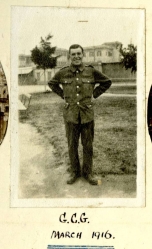 Cecil left Egypt at the end of February 1919 on a ship heading for Italy and finally reached Southampton on St. Patrick’s Day, 1919.
Cecil left Egypt at the end of February 1919 on a ship heading for Italy and finally reached Southampton on St. Patrick’s Day, 1919.
Right: George Cecil Gunning, March 1916 (click to view larger image)
Cecil soon took up work again in Belfast, at the Belfast Savings Bank. He lived in Belfast until the early 1920’s. He joined the Royal Belfast Yacht Club where he met Muriel McKinney, his future wife. They were married in 1930 at the Windsor Presbyterian Church, Lisburn Road, Belfast.10
Though the Gunning brothers’ story is special and unique to them, one can use it as a way to learn about the experiences of all soldiers who fought in the war. One can imagine just how many friends and brothers enlisted together, like Frank and Cecil, promising to fight together and come home together, to regale their friends and family with tales of their great adventures at war. One too can imagine just how many soldiers, like Frank and Cecil never got to tell their story together. Historical material like the Gunning’s diary is important because it works to bring the stories of these soldiers and others like them to life, so that their stories can—and will—be told.
Further Information
The Gunning Brothers' Collection is available online at Digital Repository Ireland.
RDFA/ 018 Gunning Brothers Collection can be viewed in the Reading Room of Dublin City Library and Archive.
Footnotes
1. IE DCLA/RDFA/018/1/3 ‘Gallipoli Memories’ . Unpublished Diary by Frank Douglas and George Cecil Gunning, (1915-1916)
2. Ibid.
3. Ibid.
4. Ibid.
5. Ibid.
6. Tom Burke. “George Cecil Gunning. ‘D’ Company, 7th Battalion Royal Dublin Fusiliers and the Royal Flying Corps” 26 May, 2000.
7. Tom Burke. “George Cecil Gunning. ‘D’ Company, 7th Battalion Royal Dublin Fusiliers and the Royal Flying Corps” 26 May, 2000.
8. Ibid.
9. Frank Douglas Gunning and George Cecil Gunning, handwritten diary, The Gunning Brothers Collection, Dublin City Archives Royal Dublin Fusiliers Association Archive, Dublin City Archive, 2000.
10. Ibid.
